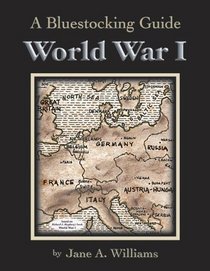Search -
Bluestocking Guide: World War I
Bluestocking Guide World War I
Author:
"A Bluestocking Guide: World War I" is designed to reinforce and enhance a student's understanding of the subject matter presented in the primer "World War I: The Rest of the Story and How It Affects You Today" an Uncle Eric book by Richard J. Maybury. — Comprehension Questions are given for each chapter and may include Definition, True/False, an... more »
Author:
"A Bluestocking Guide: World War I" is designed to reinforce and enhance a student's understanding of the subject matter presented in the primer "World War I: The Rest of the Story and How It Affects You Today" an Uncle Eric book by Richard J. Maybury. — Comprehension Questions are given for each chapter and may include Definition, True/False, an... more »
ISBN-13: 9780942617580
ISBN-10: 0942617584
Publication Date: 5/1/2005
Pages: 95
Rating: ?
ISBN-10: 0942617584
Publication Date: 5/1/2005
Pages: 95
Rating: ?
0 stars, based on 0 rating
Genres:




